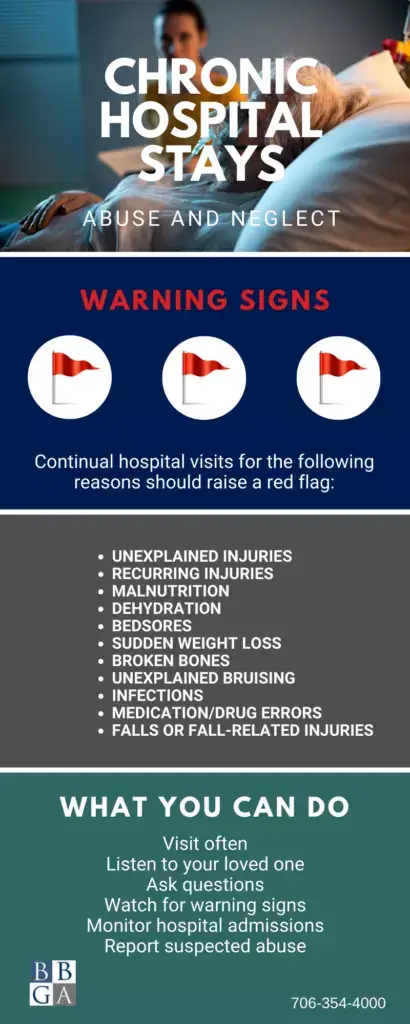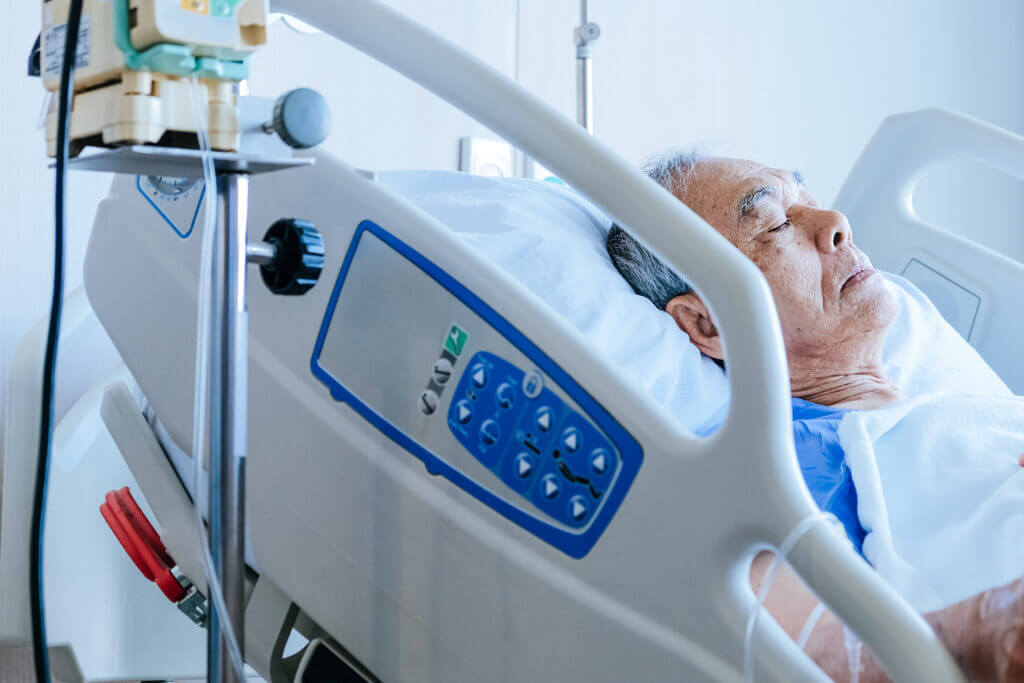Chronic Hospital Stays
Nursing Home Abuse & Neglect
 Many elderly and disabled people visit hospitals more frequently than others. However, if a nursing home resident is admitted to a Georgia hospital over and over again, it may be a sign of nursing home abuse and neglect.
Many elderly and disabled people visit hospitals more frequently than others. However, if a nursing home resident is admitted to a Georgia hospital over and over again, it may be a sign of nursing home abuse and neglect.
In 2008, patients 65-years-old and older represented 40 percent of hospitalized adults and nearly half of all health care dollars spent on hospitalization, but comprised less than 13 percent of the population in the United States, according to an article called Hospital management of older adults by Melissa Mattison, MD.
People 85 years and older makeup only 1.8 percent of the total population but account for 8 percent of all hospital discharges. And hospitalizations and health care spending for older adults is expected to rise as the population continues to age.
Are Chronic Hospital Visits a Sign of Neglect or Abuse?
Chronic hospital visits can be a sign of neglect or abuse in nursing homes or long-term care facilities. Frequent hospitalizations may indicate that a resident’s needs are not being adequately met within the facility. Here are some signs of neglect and abuse in nursing home residents with chronic hospital visits:
- Unexplained Injuries:
- Frequent fractures, bruises, or burns without a clear cause.
- Injuries that don’t match the explanations provided by the nursing home staff.
- Pressure Ulcers (Bedsores):
- Persistent or worsening bedsores, particularly in immobile residents.
- Untreated or poorly treated ulcers indicating neglect.
- Dehydration and Malnutrition:
- Signs of weight loss, dry skin, sunken eyes, or cracked lips.
- Laboratory results indicating nutritional deficiencies.
- Poor Hygiene:
- Unkempt appearance, dirty clothes, or strong body odor.
- Soiled bedding or lack of basic grooming.
- Infections:
- Repeated infections, such as urinary tract infections (UTIs) or sepsis.
- Wounds that heal slowly or worsen over time.
- Psychological Symptoms:
- Anxiety, depression, or withdrawal from social interactions.
- Sudden changes in behavior, such as fearfulness or agitation.
- Medication Errors:
- Frequent hospital visits due to overdoses or underdoses.
- Adverse reactions to medications that should be closely monitored.
- Unexplained Decline in Health:
- General deterioration in health without a clear medical cause.
- Frequent falls or sudden onset of chronic conditions.
- Poorly Managed Chronic Conditions:
- Conditions like diabetes, hypertension, or heart disease that worsen due to lack of proper care.
- Frequent hospitalizations related to unmanaged chronic illnesses.
- Lack of Supervision:
- Residents wandering off or getting lost within the facility.
- Injuries or health issues stemming from lack of appropriate oversight.

Factors Leading to Chronic Hospital Visits Due to Neglect or Abuse
- Insufficient Staffing: Understaffed facilities may not have enough caregivers to monitor and assist residents, leading to neglect.
- Inadequate Training: Staff may lack the necessary skills to properly care for residents, especially those with complex medical needs.
- Overmedication or Improper Medication Management: Errors in administering medications can cause adverse reactions or fail to control existing health conditions.
- Lack of Proper Nutrition and Hydration: Neglect in providing adequate food and water can lead to malnutrition, dehydration, and subsequent health complications.
- Poor Infection Control Practices: Inadequate hygiene and infection control can lead to repeated infections, requiring hospitalization.
- Failure to Monitor and Treat Chronic Conditions: Neglect in managing chronic diseases like diabetes or hypertension can lead to serious health crises.
- Delayed Medical Attention: Slow or absent responses to medical emergencies or changes in a resident’s condition can exacerbate issues, leading to hospitalization.
- Emotional and Physical Abuse: Abuse can lead to both physical injuries and psychological trauma, necessitating frequent hospital visits.
- Unsanitary Living Conditions: Dirty or hazardous environments can lead to infections, respiratory issues, and other health concerns requiring medical intervention.
- Failure to Provide Necessary Medical Equipment: Lack of access to necessary medical devices (e.g., wheelchairs, oxygen tanks) can lead to health deterioration and hospitalization.
While chronic hospital visits alone are not definitive proof of neglect or abuse, they can be a red flag, especially if there are other signs of inadequate care. It’s important for family members and healthcare professionals to investigate the underlying causes of frequent hospitalizations to ensure the resident is receiving the proper care and is not a victim of neglect or abuse.
What Georgia Doctors and Hospital Staff Should be Doing
To ensure a Georgia nursing home resident is discharged back to a safe and healthy environment, doctors, nurses, hospital social workers, and other hospital staff typically interview the patient and/or a family member to make sure the patient is not being abused and can manage when not at the hospital. Any red flags or concerns should be addressed at this time, especially if abuse or neglect is suspected.

Nursing Home Statistics
- 15,600 U.S. nursing homes (2014)
- 1.7 million licensed beds in the U.S. (2014)
- 24% of Americans die each year in a nursing home
- 90% of nursing homes are understaffed
- Nursing homes are notorious for forcing patients and their families to sign away their rights
- In 2008, approximately 269,000 complaints about elder mistreatment were registered and 78% of those related to nursing home care
How can a Nursing Home Abuse Attorney Help?
A nursing home abuse attorney plays a crucial role in protecting the rights and well-being of nursing home residents who may be victims of neglect or abuse. Here’s how an attorney can help:
Investigation and Evidence Collection
- Thorough Investigation: An attorney will conduct a detailed investigation into the circumstances surrounding the suspected abuse or neglect. This includes gathering medical records, interviewing witnesses, and obtaining facility inspection reports.
- Expert Consultation: Attorneys often work with medical experts to evaluate the extent of the injuries or the impact of neglect. These experts can provide testimony to support the case.
Legal Advice and Guidance
- Understanding Rights: A nursing home abuse attorney helps victims and their families understand their legal rights and the options available to them.
- Case Evaluation: The attorney can assess whether there is a valid legal claim and advise on the best course of action, including whether to pursue a lawsuit or settlement.
Filing a Lawsuit
- Drafting Legal Documents: The attorney will handle all aspects of filing a lawsuit, including drafting and filing the necessary legal documents.
- Representation in Court: If the case goes to trial, the attorney will represent the victim in court, presenting evidence and making legal arguments to seek justice.
Negotiation and Settlement
- Negotiating Settlements: In many cases, nursing home facilities may prefer to settle the case out of court. An attorney can negotiate a settlement that fairly compensates the victim for their suffering, medical expenses, and other damages.
- Ensuring Fair Compensation: The attorney will work to ensure that any settlement reflects the true extent of the harm caused, including future medical needs and pain and suffering.
Holding the Facility Accountable
- Accountability: By pursuing legal action, the attorney can help hold the nursing home accountable for their actions or inaction, potentially leading to changes in their practices to prevent future abuse or neglect.
- Punitive Damages: In cases of particularly egregious abuse or neglect, the attorney may seek punitive damages, which are intended to punish the facility and deter similar behavior in the future.
Advocating for Policy Changes
- Impact on Policy: Successful legal actions can sometimes lead to broader changes in laws or regulations governing nursing homes, improving the standard of care for all residents.
- Public Awareness: High-profile cases can raise awareness about the issue of nursing home abuse, prompting greater scrutiny and better protections for residents.
Pursuing Compensation
- Recovering Costs: The attorney will seek compensation for medical bills, pain and suffering, emotional distress, and in some cases, wrongful death.
- Long-Term Care Needs: If the abuse or neglect has caused long-term harm, the attorney can seek compensation to cover ongoing care needs.
Contact Us
The nursing home abuse attorneys at BBGA advocate for victims and their families, working to ensure that justice is served and that victims receive the compensation they deserve. We hold negligent or abusive facilities, doctors, nurses, and other staff accountable when their actions cause harm to residents. Contact us for a free, no-obligation consultation. You can reach us at 706-354-4000 or fill out our contact form and someone will be in touch. There is no charge unless we recover money for you in your case.

